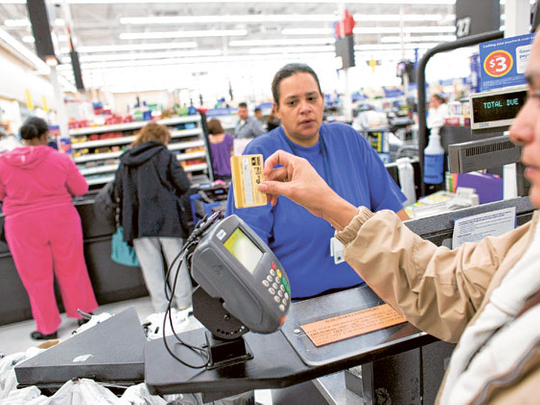
New York: Adam Baker shed no tears when he and his wife closed the last of their three credit-card accounts in 2008.
"It was a really cool experience," says the Shelbyville, Indiana, resident. "We don't need credit cards. And a 2 per cent cash back reward" for using one "is not enough enticement".
Californian Josh McElravy stopped using credit cards early this year, using an online person-to-person loan to slash credit-card debt that peaked at nearly $10,000. "A debit card provides the convenience of plastic without worrying about banks charging you 20 per cent interest" on unpaid balances, says McElravy, an electronic money transfers specialist at a bank in Santa Clara, California.
Losing sheen
The credit card — that familiar 3-1/4-by-2-1/8 inches of plastic purchasing punch — is not exactly headed for history's trash bin. But it is losing its sheen as Americans' preferred method of payment. Since 2005, consumers have used debit cards more often than credit cards, says The Nilson Report, a payment-systems newsletter in Carpinteria, California. By 2016, it forecasts, they'll spend more on debit cards, too.
Why the switch? One big reason is that hard econ-omic times and tight lending conditions have forced card issuers to pare risky accounts and consumers to trim card balances. The shift is especially evident among young adults, many of whom seem to prefer a pay-as-you-go approach.
For example, depending on the debit-card rules that the Federal Reserve adopts, consumers could have to pay — or pay more — for chequing accounts tied to debit cards and "get fewer benefits associated with debit-card use," says Shawn Miles, head of global public policy at MasterCard Worldwide, based in Purchase, New York
Since the recession, consumers have been paring credit-card use. In September, the level of revolving debt (mostly from credit cards) was down nearly 18 percent compared with December 2008, Fed data show. By the end of September, the number of open credit-card accounts was down 24 per cent from its 2008 peak, the Federal Reserve Bank of New York said.
"After the economic trough, we do expect debit cards to remain more popular than credit cards," says Brian Riley, senior research director of bank-card services at TowerGroup, a financial-services research and advisory firm. He expects "the recession's mental effect on people" to linger, since "it will take decades for households to regain the net worth they had in 2007."
Not everyone
Some disagree. "I use credit cards," says Tim Chen, a millennial and founder of NerdWallet.com, a credit-card website in New York. "Most of my friends working in finance use them. They're trying to get rewards from credit-card usage that are usually better than with debit cards."
Once the economy strengthens, consumers typically spend more — and boost credit-card use, he adds. This year the average household will charge $1,703 (Dh6,263) per month on credit cards, the highest level since 2002, says Lauren Guenveur, study director for financial services practices at Synovate, a New York market-research firm.
Credit-card reforms could have a mixed impact on the shift to debit cards. While the Credit Card Accountability, Responsibility and Disclosure Act of 2009 creates numerous new card-user protections, it also contains possible disincentives to credit-card use. Among the latter: The law bars those under age 21 from obtaining a credit card unless they can show proof of enough income to pay off debts or have an adult as cosigner.
Charges
On the other hand, a part of the Dodd-Frank Wall Street reforms could lead to new fees on chequing accounts and/or debit cards.
Many observers believe a provision of the so-called Durbin Amendment, which aims to ensure swipe fees are "reasonable and proportional to the processing costs incurred," will cut interchange fee revenue for banks.
As a result, banks could begin charging debit-card users, says Miles of MasterCard.
The legislation takes effect in July.








